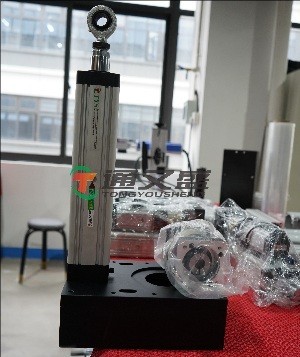Rubber products are widely used in numerous fields such as automotive, aerospace, and construction. With the continuous improvement of market requirements for the quality and performance of rubber products, technological innovation in rubber machinery has become urgent. As an actuator that converts the rotational motion of a servo motor into linear motion through a lead screw, the force-controlled electric cylinder offers advantages such as high precision, high response speed, energy conservation and environmental protection, and easy control, gradually emerging in rubber machinery.
Rubber Injection Molding Machines
In rubber injection molding machines, force-controlled electric cylinders are mainly used to achieve the front-and-rear movement of the injection unit, the rotation and axial movement of the screw, and the opening/closing of the mold.
Traditional hydraulically driven injection molding machines suffer from issues such as slow response speed, low control precision, and high energy consumption. After adopting force-controlled electric cylinders, the positioning accuracy of the injection unit's movement can be improved to ±0.01mm, enabling precise control of the injection volume and speed according to different rubber materials and product requirements.
For example, when producing high-precision rubber seals, the force-controlled electric cylinder can quickly and accurately inject rubber melt into the mold cavity, avoiding product dimensional deviations and quality defects caused by inaccurate injection volume. At the same time, the fast response characteristics of the force-controlled electric cylinder make the mold opening/closing action more rapid, shortening the molding cycle and improving production efficiency.

Calenders
Calenders are key equipment in rubber processing for producing rubber sheets of specific thickness and shape from mixed rubber. The application of force-controlled electric cylinders in calenders is mainly reflected in the lifting of rollers and pressure adjustment.
By precisely controlling the spacing and pressure between rollers through
force-controlled electric cylinders, rubber sheets with uniform thickness and good surface quality can be produced.
Compared with traditional mechanical or hydraulic adjustment methods, force-controlled electric cylinders offer higher adjustment precision and stability.
For example, when producing tire tread rubber, the force-controlled electric cylinder can dynamically adjust the roller pressure according to the rubber's properties and production process requirements, ensuring that the thickness tolerance of the rubber sheet is controlled within a very small range, thereby improving the quality and performance of tires.
Vulcanizers
Vulcanizers are key equipment for rubber product molding, primarily used to induce vulcanization reactions in rubber under specific temperature, pressure, and time conditions to achieve the required physical and mechanical properties.
Force-controlled electric cylinders are used in vulcanizers for actions such as mold opening/closing, platen lifting, and pressure application.
Traditional vulcanizers mostly use hydraulic drive, suffering from problems such as oil leakage, high maintenance costs, and environmental pollution. The application of force-controlled electric cylinders effectively solves these issues while improving the control precision of the vulcanization process.
For example, when producing rubber seals, the force-controlled electric cylinder can precisely control the mold closing speed and pressure, ensuring uniform pressure on the rubber during vulcanization to avoid defects such as bubbles and rubber shortages, and improving product qualification rates.
In addition, force-controlled electric cylinders can be integrated with sensors for temperature, time, etc., to achieve automated control of the vulcanization process, enhancing production efficiency and the stability of product quality.
